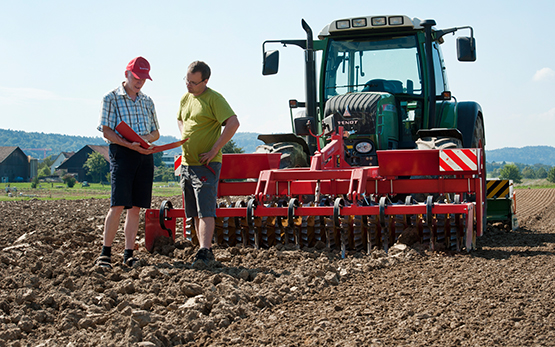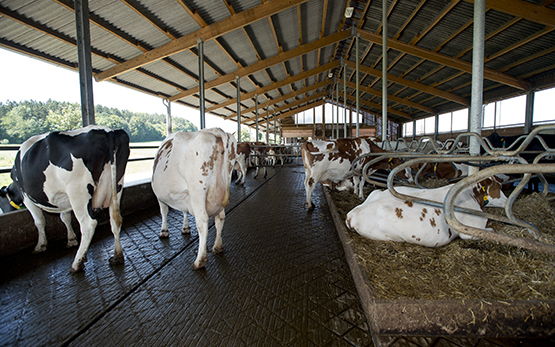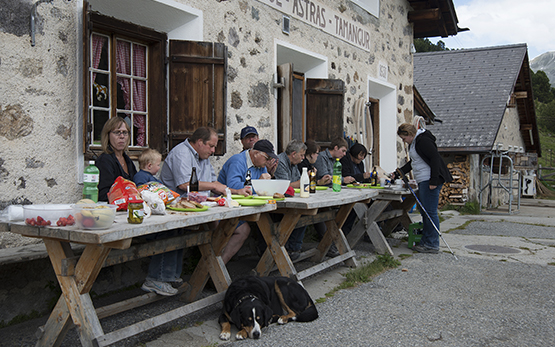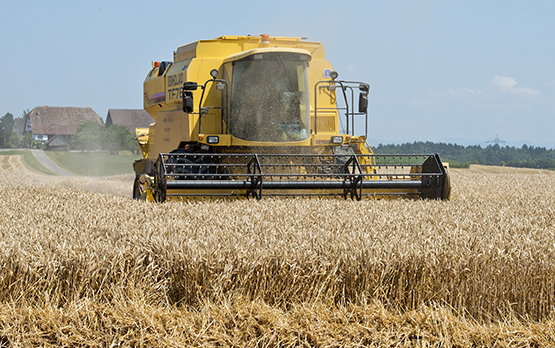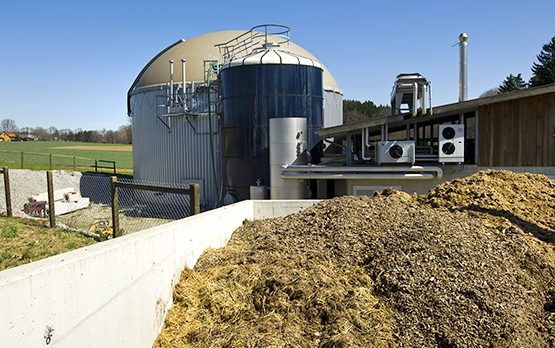Galley S., Saleh R., Bottazzi P.
Benefit perceptions and their influence on the willingness to join community supported agriculture (CSA).
Cleaner and Responsible Consumption, 17, 2025, Article 100263.
Galley S., Saleh R., Bottazzi P.
Growing together – How institutional structures influence communal agricultural prosumption types and their potential for continuity.
Journal of Rural Studies, 116, 2025.
Abreu Novais M., Del Papa B., Han Q., Mohan K., Vásárhelyi O., Wang Y., Zejnilovic L.
Investigating patterns of tourist movement using multiple data sources.
Journal of Vacation Marketing, In Press, 2025.
Wang Y., Hug S., Irek J., Finger R.
Product differentiation, quality, and milk price stability: The case of the Swiss cheese market.
Applied Economic Perspectives and Policy, 47, (1), 2025, 416-435.
Spörri M., Haller M., El Benni N., Mack G., Finger R.
How farmers' self‑identities affect agri‑environmental transition in grassland use: A mixed method study in the Swiss alpine region.
Agriculture and Human Values, 42, 2025, 319-332.
Ammann J., Saleh R.
Swiss public's acceptance and sustainability perceptions of food produced with chemical, digital and mechanical weed control measures and the influence of information source on technology perception in agriculture.
Zenodo, Dataset, 2024
El Benni N., Ritzel C., Mack G.
Why the administrative burden of cross compliance matters.
EuroChoices, 2024, Article 12454.
Ammann J., Mack G., El Benni N.
Welche Informationen finden die Konsumentinnen und Konsumenten hilfreich beim Kauf von Fleisch und Milchprodukten?
In: 47. Agrarökonomie-Tagung. 19. November, Publ. Agroscope, Tänikon (CH). 2024.
Jin S., Cao Y., Burd M., Tindale S., Feng Z., Green O., Newell-Price P., Vicaro-Modroño V., Mack G., Sánchez-Zamora P., Gallardo-Cobos R., Spörri M., El Benni N., Alonso N., Miškolci S. and others
Farmer identities and permanent grassland management: Evidence from five European biogeographic zones.
People and Nature, 6, (6), 2024, 2228-2245.
Tindale S., Cao Y., Jin S., Green O., Burd M., Vicario-Modrono V., Alonso N., Clingo S., Gallardo-Cobos R., Sanchez-Zamora P., Hunter E., Miskolci S., Mack G., El Benni N., Spoerri M. and others
Tipping points and farmer decision-making in European permanent grassland (PG) agricultural systems.
Journal of Rural Studies, 110, 2024, 1-13.
Ritzel C., Mann S.
Cooperative forms of food production: The effect of organizational decision-making capacity and social capital on perceived benefits.
In: 187th Seminar of the European Association of Agricultural Economists (EAAE). 14 June, Frick. 2024, 1-14.
Mielewczik M., Simunek M., Hossfeld U.
Letter to the editor: Do we really have to rephrase two of the most sensitive periods in the early history of genetics?
Folia Mendeliana, 59, (2), 2024, 23-29.
Ammann J., Mack G., El Benni N., Jin S., Newell-Price P., Tindale S., Hunter E., Vicario-Modrono V., Gallardo-Cobos R., Sánchez-Zamora P., Miskolci S., Frewer L. J.
Consumers across five European countries prioritise animal welfare above environmental sustainability when buying meat and dairy products.
Food Quality and Preference, 117, 2024, 1-11.
Mielewczik M., Rödiger M., Zorn A., Roesch A., Heitkämper K.
Working time requirements for farm management work in organic and herbicide-reduced production of arable crops.
In: 17. Wissenschaftstagung Ökologischer Landbau. 5-8 March, Giessen. 2024, 427-428.
Garcia V., Möhring N., Wang Y., Finger R.
Risk perceptions, preferences and the adoption dynamics of pesticide-free production.
Journal of Agricultural and Resource Economics, 49, (1), 2024, 102-123.
Mink S., Loginova D., Mann S.
Wolves' contribution to structural change in grazing systems among swiss alpine summer farms: The evidence from causal random forest.
Journal of Agricultural Economics, 75, (1), 2024, 201-217.
Mack G., El Benni N., Spörri M., Huguenin-Elie O., Tindale S., Hunter E., Newell Price P., Frewer L.
Perceived feasibility of sward management options in permanent grassland of Alpine regions and expected effects on delivery of ecosystem services.
Environment, Development and Sustainability, 26, 2024, 4579-4601.
Mielewczik M., Simunek M., Hossfeld U.
On a possible dating of Mendel´s notes and knowledge on meteorology.
Folia Mendeliana, 59, (2), 2023, 19-21.
Mielewczik M., Vollmann J., Moll J., Simunek M. V., Hoßfeld U.
Ein verkanntes Genie?: Mendels Entdeckungen und ihre Bedeutung für Pflanzenzüchtung und die Grüne Revolution.
Naturwissenschaftliche Rundschau, 76, (7), 2023, 362-369.
Cracco M., Ritzel C.
The effect of Swiss Regional nature parks on agricultural earnings: Evaluating the impact of parks using causal analysis methods.
In: 5th Swiss parks research conference. 12 September, Lausanne. 2023, 1-18.
Wang Y., Schaub S., Wuepper D., Finger R.
Culture and agricultural biodiversity conservation.
Food Policy, 120, 2023, 1-20.
Wang Y., Möhring N., Finger R.
Nachbarschaftseffekte und die Umstellung zu pestizidfreien Weizenanbausystemen.
7. März, 2023.
Ritzel C., Mann S., van Zyl-Bulitta V.
Prosuming alone or together: A bisectoral approach to conceptualizing the commons prosumer.
International Journal of the Commons, 16, (1), 2023, 295-309.
Ritzel C., Hoop D., Mack G., Portmann, M., Wallner, A.
Swiss Parks of National Importance as model regions of sustainable development: An economic success story for farmers?
In: 51. Jahrestagung der Schweizerischen Gesellschaft für Agrarwirtschaft und Agrarsoziologie. 20. April, Lindau. 2023.
Wang Y., Delgado M. S., Xu J.
When and where does it pay to be green?: A look into socially responsible investing and the cost of equity capital.
International Journal of Corporate Social Responsibility, 8, 2023, 1-23.
Heitkämper K., Reissig L., Bravin E., Glück S., Mann S.
Digital technology adoption for plant protection: Assembling the environmental, labour, economic and social pieces of the puzzle.
Smart Agricultural Technology, 4, 2023, 1-11.
Wang Y., Möhring N., Finger R.
When my neighbors matter: Spillover effects in the adoption of large-scale pesticide-free wheat production.
Agricultural Economics, 54, (2), 2023, 256-273.
Wang Y., Finger R.
Pest prevention, risk, and risk management: The case of Drosophila suzukii.
Journal of the Agricultural and Applied Economics Association, 2, (1), 2023, 98-113.
Spörri M., El Benni N., Mack G., Finger R.
Spatio-temporal dynamics of grassland use intensity in Switzerland.
Regional Environmental Change, 23, (23), 2023, 1-11.
Haller M., Mann S.
Konsequenzen eines verminderten Pflanzenschutzmitteleinsatzes: Erfahrungen aus dem Kanton Bern.
Agroscope Science, 150, 2023.
Ritzel C., Hoop D., Portmann M., Wallner A., Mack G.
Swiss Parks of National Importance as model regions of sustainable development: An economic success story for farmers?
Land Use Policy, 124, 2023, 1-15.
Mielewczik M., Vollmann J., Moll J., Simunek M., Hossfeld U.
Die Bedeutung der Erkenntnisse Gregor Mendels für die Pflanzenzüchtung.
In: Geschäftsbericht. Publ. Gemeinschaft zur Förderung von Pflanzeninnovationen e.V. (GFPi). 2022, 2-5.
Mielewczik M., Moll J., Simunek M., Hossfeld U.
Some oddities on the early origins and inspirations on Mendel´s experiments and the "rediscovery" of the Mendelian Laws in 1900.
Folia Mendeliana, 58, (2), 2022, 17-31.
Mielewczik M., Moll J., Simunek M., Hossfeld U.
A previously unknown meteorological publication of Gregor J. Mendel from 1857.
Folia Mendeliana, 58, (2), 2022, 11-16.
Mink S., Mann S.
The effect of wolves on the exit and voicing exit of Swiss mountain farmers.
Journal of Rural Studies, 96, 2022, 167-179.
Mielewczik M., Moll J., Simunek M., Hossfeld U.
Vererbung und Akklimatisierung: Neue Einsichten aus einer neuen kritisch-kommentierten Edition von Gregor Mendels Artikel "Versuche über Pflanzen-Hybriden".
BIOspektrum, 28, (05), 2022, 539.
Mink S.
Führt der Wolf zur Aufgabe der Bergbetriebe?
In: 45. Agrarökonomische Tagung Agroscope 2022. 04. Oktober, Agroscope, Tänikon. 2022.
Mielewczik M., Heitkämper K.
Framework zur Abschätzung von Wegstrecken beim Einsatz von Feld- und Schwarmrobotern am Beispiel der Ernte.
In: Arbeit unter einem D-A-CH: Der Landwirt im 4.0-Modus. 8./9. März 2022 Potsdam. 23. Arbeitswissenschaftliches Kolloquium. 8./9. März, Publ. Leibniz-Institut für Agrartechnik und Bioökonomie e.V., Redaktion Martina Jakob. 2022, 169-191.
Mielewczik M., Simunek M., Hossfeld U.
Mönch und Naturwissenschaftler: Vor 200 Jahren wurde Gregor Johann Mendel, Begründer der Genetik, geboren.
nd.dieWoche, (165), 2022, 23-23.
Mielewczik M., Moll J., Simunek, M. V., Hossfeld, U.
New insights from a new critically commented edition of Mendel’s classic article on plant-hybridization and its role in the transformation of science and agriculture.
In: Mendel Genetics Conference. 22. Juli, Brno, Masaryk University Mendel University in Brno Moravian Museum Augustinian Abbey in Brno Společně, o.p.s. 2022.
Mielewczik M., Moll J., Simunek M., Hossfeld, U.
"Versuche über Pflanzen-Hybriden" - neue Einsichten: 200 Jahre Gregor Mendel.
BIOspektrum, 28, 2022, 565.
Cloete K., Mann S., Delport M.
Confident or captured? Commercial producers in South Africa.
International Journal of Social Economics, 49, (7), 2022, 976-992.
Heitkämper K., Bravin E., Keller M.
Arbeiten mit digitalen Technologien: Eine Fallstudie am Beispiel von sensor- und kameragesteuertem Hacken und Spritzen im Gemüsebau.
In: Jahrestagung der Charta Digitalisierung. 11. Mai, Publ. Agridea, Sursee, Fenaco. 2022.
Reissig L.
Farmers and their data: An examination of farmers’ attitude towards data sharing according to the stage of digital farming adoption: 3.2.6.
In: Farm data integration – key to cattle management success: COWDATA finale report. Mai, Publ. ICT-AGRI ERA-NET. 2022, 30.
Reissig L.
Einfluss sozialer und psychologischer Faktoren auf die Adaption digitaler Technologien in der Landwirtschaft durch Betriebsleiter und Betriebsleiterinnen in der Schweiz.
In: 42. GIL-Jahrestagung. 17.-18. Februar, Publ. M. Gandorfer, C. Hoffmann, N. El Benni, M. Cockburn, T. Anken, H. Floto, Gesellschaft für Informatik e.V. (GI). 2022, 241-246.
Reissig L., Mack G.
Why farmers perceive the use of e-government services as an administrative burden: A conceptual framework on influencing factors.
Journal of Rural Studies, 89, 2022, 387-396.


